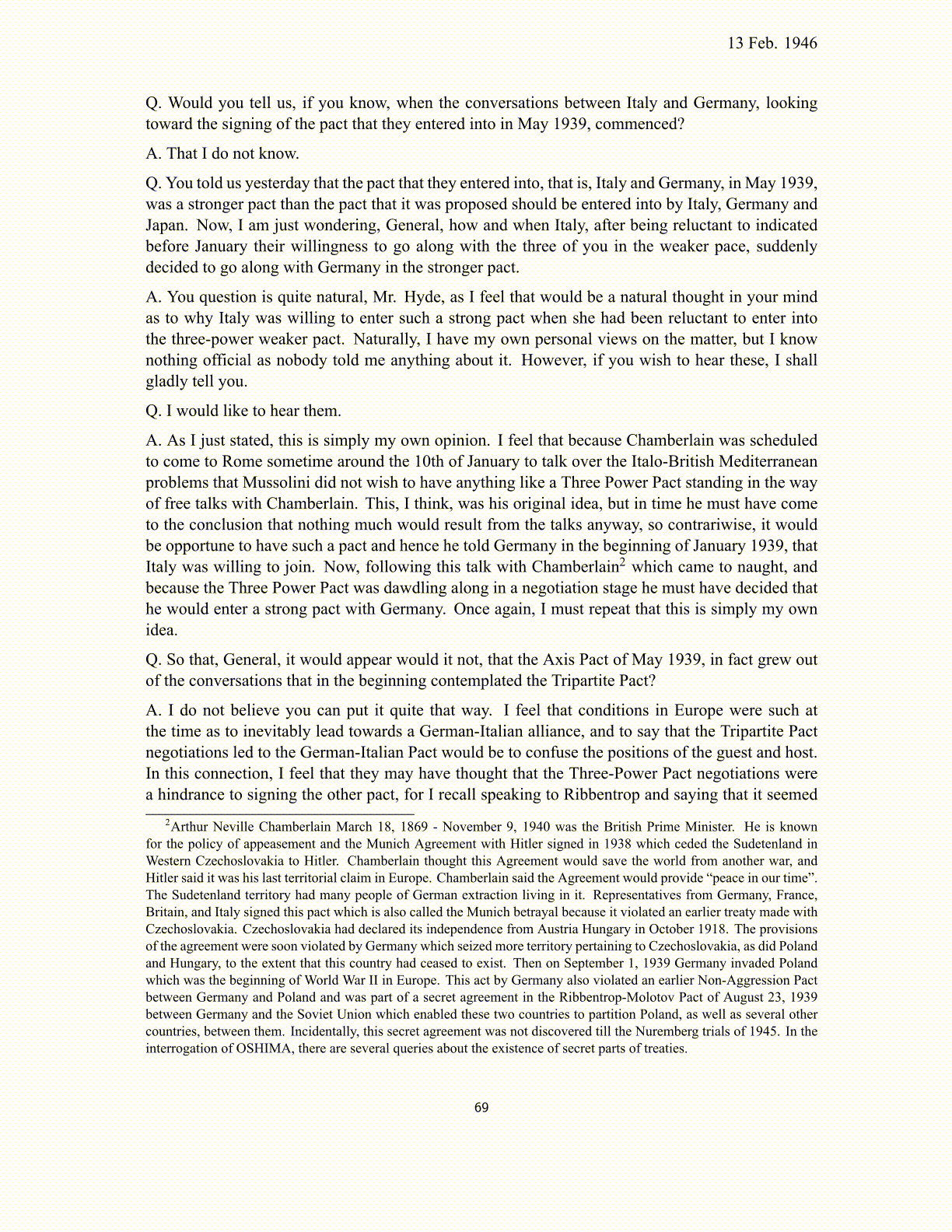
13 Feb. 1946 Q. Would you tell us, if you know, when the conversations between Italy and Germany, looking toward the signing of the pact that they entered into in May 1939, commenced? A. That I do not know. Q. You told us yesterday that the pact that they entered into, that is, Italy and Germany, in May 1939, was a stronger pact than the pact that it was proposed should be entered into by Italy, Germany and Japan. Now, I am just wondering, General, how and when Italy, after being reluctant to indicated before January their willingness to go along with the three of you in the weaker pace, suddenly decided to go along with Germany in the stronger pact. A. You question is quite natural, Mr. Hyde, as I feel that would be a natural thought in your mind as to why Italy was willing to enter such a strong pact when she had been reluctant to enter into the three-power weaker pact. Naturally, I have my own personal views on the matter, but I know nothing official as nobody told me anything about it. However, if you wish to hear these, I shall gladly tell you. Q. I would like to hear them. A. As I just stated, this is simply my own opinion. I feel that because Chamberlain was scheduled to come to Rome sometime around the 10th of January to talk over the Italo-British Mediterranean problems that Mussolini did not wish to have anything like a Three Power Pact standing in the way of free talks with Chamberlain. This, I think, was his original idea, but in time he must have come to the conclusion that nothing much would result from the talks anyway, so contrariwise, it would be opportune to have such a pact and hence he told Germany in the beginning of January 1939, that Italy was willing to join. Now, following this talk with Chamberlain 2 which came to naught, and because the Three Power Pact was dawdling along in a negotiation stage he must have decided that he would enter a strong pact with Germany. Once again, I must repeat that this is simply my own idea. Q. So that, General, it would appear would it not, that the Axis Pact of May 1939, in fact grew out of the conversations that in the beginning contemplated the Tripartite Pact? A. I do not believe you can put it quite that way. I feel that conditions in Europe were such at the time as to inevitably lead towards a German-Italian alliance, and to say that the Tripartite Pact negotiations led to the German-Italian Pact would be to confuse the positions of the guest and host. In this connection, I feel that they may have thought that the Three-Power Pact negotiations were a hindrance to signing the other pact, for I recall speaking to Ribbentrop and saying that it seemed 2 Arthur Neville Chamberlain March 18, 1869 - November 9, 1940 was the British Prime Minister. He is known for the policy of appeasement and the Munich Agreement with Hitler signed in 1938 which ceded the Sudetenland in Western Czechoslovakia to Hitler. Chamberlain thought this Agreement would save the world from another war, and Hitler said it was his last territorial claim in Europe. Chamberlain said the Agreement would provide “peace in our time”. The Sudetenland territory had many people of German extraction living in it. Representatives from Germany, France, Britain, and Italy signed this pact which is also called the Munich betrayal because it violated an earlier treaty made with Czechoslovakia. Czechoslovakia had declared its independence from Austria Hungary in October 1918. The provisions of the agreement were soon violated by Germany which seized more territory pertaining to Czechoslovakia, as did Poland and Hungary, to the extent that this country had ceased to exist. Then on September 1, 1939 Germany invaded Poland which was the beginning of World War II in Europe. This act by Germany also violated an earlier Non-Aggression Pact between Germany and Poland and was part of a secret agreement in the Ribbentrop-Molotov Pact of August 23, 1939 between Germany and the Soviet Union which enabled these two countries to partition Poland, as well as several other countries, between them. Incidentally, this secret agreement was not discovered till the Nuremberg trials of 1945. In the interrogation of OSHIMA, there are several queries about the existence of secret parts of treaties. 69